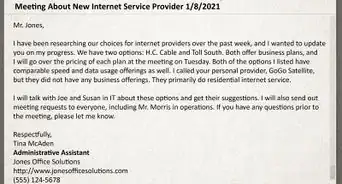This article was co-authored by Lauren Krasny. Lauren Krasny is a Leadership and Executive Coach and the Founder of Reignite Coaching, her professional and personal coaching service based in the San Francisco Bay Area. She also currently coaches for the LEAD Program at Stanford University Graduate School of Business and is a former Digital Health Coach for Omada Health and Modern Health. Lauren received her coaching training from the Coach Training Institute (CTI). She holds a BA in Psychology from the University of Michigan.
This article has been viewed 81,241 times.
When your boss is insecure, your work dynamic can be stressful and unproductive. Working with an insecure boss is challenging, but certainly not impossible. Fortunately, you can improve your work environment and foster a more productive and harmonious space by focusing on positives and helping boost your boss’s self-esteem.
Steps
Responding to an Insecure Boss
-
1Recognize that your boss’s distrust doesn’t reflect on you. An insecure boss typically distrusts their employees, employers, and even their workplace in general. Your boss might blame others for things that go wrong at the workplace, or may assume that people are out to get them or their job. This isn’t a reflection of anything that you’ve done wrong and indicates your boss’s self-doubt.
-
2Keep in regular contact with your boss. Many insecure bosses are indecisive and fail to give their employees a clear sense of direction. Then, they’ll hide in their office or have regular out-of-office engagements, making them more or less unavailable. Disorder is frustrating for you, and knowingly or not, can help your boss feel needed and important. Rather than play hide and seek, approach the situation directly and ask for clarification and direction in writing.[1]
- This works well with transparency. Send your boss regular email messages asking for direction and clarification. Because this will become routine, your boss should eventually feel comfortable giving you some guidance.
- You can develop a routine of following up, for example, and send an email after each conversation that says, “Dear Ms. _____, Per our conversation today at 3:30 pm, I will go ahead and get the Johnson file in order and sent to the Records department. Would you like me to send a copy to Mr. Bates in Processing as well?”
Advertisement -
3Redirect the micromanager. Insecure bosses will often micromanage their employees in an effort to maintain control and a sense of power and importance. This can be nerve-wracking for employees and exhausting for the insecure boss. Fortunately, you don’t have to sit back and take it. Be proactive in earning your boss’s trust, showing them that you can work independently and that you won’t betray them.[2]
- Transparency is excellent here too because your boss will have little to micromanage if they’re left in the loop of your workday.
- You can send your boss a message at the beginning of each shift that says something like, “Dear Mr. Foster, As we discussed yesterday, I will be alphabetizing the 2015-6 files, unless something has come up that you’d like me to work on beforehand.”
-
4Find productive ways to handle your frustration. If you have an insecure boss, then you may feel frustrated on a daily basis. However, it is important to avoid acting on your frustration in passive-aggressive ways. Instead, try to find some productive ways that you can handle your frustrations.[3]
- Take a brisk walk on your lunch break.
- Close your door or take a bathroom break for five minutes and do some deep breathing.
- Chat with a supportive coworker during lunch.
Working with an Insecure Boss
-
1Be transparent. There is little that fuels anxiety and self-doubt like the unknown. Your boss’s insecurity may be aggravated if they are unclear about who you’re talking with, what steps you’re taking to complete a task, or what your vision is for the future. While it may seem unnecessary and time consuming, get in the habit of letting your boss know what you’re up to by sending emails, showing them records or receipts, and talking with them in meetings.[4]
- Try not to be too obvious, as that may have the exact opposite effect that you want. Instead, establish a routine between you and your boss, such as checking in every other day via email to let them know your progress and your agenda for the next day.
- You can send an email that says, “Dear Ms. Brown, I followed up with the rental vehicle account and they’ve assured me that they’ll have the estimates to you by the close of business today. Also, I spoke with Marge in payables, and she asked if we could call a department-wide meeting.”
-
2Share opportunities with your boss. Including your boss in opportunities and initiatives is an all-around great idea. Sharing opportunities lets your boss know that you’re a team player, and that you won’t exclude them. Collaboration and sharing also generates twice the good ideas.[5]
- Sharing opportunities also gives your boss more reason to trust you and should make you feel like less of a threat.
- Let your boss know, “Hey! The CEO sent me a message to follow up on my presentation yesterday and asked that I create a longer presentation for the upcoming regional meeting. I told him that I’d talk with you and that we’d work on it right away.”
-
3Link your success to your boss. Thriving under an insecure boss can be very tough. You have best chances if you can link your success directly to your boss's. Make them realize that your successes would not be possible without their able guidance and leadership. Also highlight that your career progress will glorify him as a boss.[6]
- This is different than giving your boss credit for work that you’ve done. Linking your success simply means that you publicly and privately acknowledge that your boss had some part in facilitating your achievements.
- “Thank you, Sir. Because you hired me, you gave me an opportunity to establish myself in the field. Now that I’m accepting another opportunity, I want to let you know that my growth wouldn’t have been possible without your guidance, tutelage, and leadership.”
-
4Seek your boss’s guidance. If your boss is a micromanager, then checking with them before you start on a task may help to prevent your boss from criticizing you later. Seeking guidance from your boss may also fulfill their need to feel noticed and competent.
- Try saying something like, “Hey Mrs. Smith, do you have a minute? I want to make sure that I am doing this the right way, so I was hoping you could give me some advice.”
Protecting Yourself from an Insecure Boss
-
1Focus on your boss’s positive qualities. Your boss is insecure and making your work life uncomfortable, but your boss does have lessons to teach you. Focusing on your boss’s strengths has two benefits: it shows you behaviors and skills that you can emulate in the workplace, and it gives you an opportunity to compliment your boss and boost their ego.[7]
- Boosting your boss’s ego should help them overcome some of their workplace insecurity.
- “Ms. Cantor, you have such a talent for seeing the larger picture and envisioning potential pitfalls. I’m really learning so much from you.”
-
2Abandon ideas of making your boss feel more secure. Your boss’s insecurity has nothing to do with you because it’s an internal conflict. Because of that, there’s nothing you can do to fix the problem and make them feel better or more secure. Instead of focusing your energies on making your boss feel better about his or herself, do your job well and with transparency, which should help them feel more comfortable.[8]
-
3Don’t engage in office gossip. It’s a good idea to stay away from office gossip and people with negative attitudes in the workplace. If you fraternize with the negative folks and the gossipers, you’ll ultimately be associated as one of them, even if you do nothing more than listen. This crowd certainly bothers your insecure boss the most, and you want to avoid being associated with them.[9]
- If coworkers approach you with gossip or persistent complaints about the workplace, your best course of action is to consistently redirect them to another topic of conversation.
- If they persist, tell them that you’re not comfortable with that topic. You can say, “Jane, I really like your company and respect you as a coworker. I’d like it if we don’t discuss office politics, though, and focus instead on this exciting new project that we have.”
-
4Seek support from loved ones outside of work.[10] Make sure that you talk with caring friends and family members about what you have been dealing with at work. This can help you to process the situation and you may even feel better just from talking about what is going on.[11]
- Try meeting a friend for coffee over the weekend or on your day off.
- Call up a parent, sibling, or other caring relative and ask if you can talk with them about something that has been happening at work.
-
5Take care of yourself. Workplace frustration can take a toll on your overall well-being, so make sure that you are making plenty of time for self-care.[12] You can do this by remembering to eat healthy, exercise, get plenty of rest, and making time for your hobbies.
- Avoid using alcohol, drugs, or other unhealthy substances to cope with how you are feeling.
- Try doing something special for yourself now and then as well, such as getting a massage or buying yourself a new book.
Expert Q&A
-
QuestionWhat can I do to improve my relationships at work?
 Lauren KrasnyLauren Krasny is a Leadership and Executive Coach and the Founder of Reignite Coaching, her professional and personal coaching service based in the San Francisco Bay Area. She also currently coaches for the LEAD Program at Stanford University Graduate School of Business and is a former Digital Health Coach for Omada Health and Modern Health. Lauren received her coaching training from the Coach Training Institute (CTI). She holds a BA in Psychology from the University of Michigan.
Lauren KrasnyLauren Krasny is a Leadership and Executive Coach and the Founder of Reignite Coaching, her professional and personal coaching service based in the San Francisco Bay Area. She also currently coaches for the LEAD Program at Stanford University Graduate School of Business and is a former Digital Health Coach for Omada Health and Modern Health. Lauren received her coaching training from the Coach Training Institute (CTI). She holds a BA in Psychology from the University of Michigan.
Executive, Strategic, & Personal Coach Try to be open and authentic with your coworkers. Take them up on their offers when they ask you if you want to hang out outside of work. At the same time, avoid oversharing or getting too personal to avoid crossing any boundaries.
Try to be open and authentic with your coworkers. Take them up on their offers when they ask you if you want to hang out outside of work. At the same time, avoid oversharing or getting too personal to avoid crossing any boundaries.
References
- ↑ Lauren Krasny. Executive, Strategic, & Personal Coach. Expert Interview. 27 March 2020.
- ↑ https://hbr.org/2011/09/stop-being-micromanaged
- ↑ http://psychcentral.com/lib/6-ways-to-stress-less-at-work/
- ↑ https://hbr.org/2014/12/managing-3-types-of-bad-bosses
- ↑ https://whatthebestmanagersknowanddo.com/2013/01/29/the-insecure-boss-managing-poor-management/
- ↑ Lauren Krasny. Executive, Strategic, & Personal Coach. Expert Interview. 27 March 2020.
- ↑ https://hbr.org/2014/12/managing-3-types-of-bad-bosses
- ↑ https://whatthebestmanagersknowanddo.com/2013/01/29/the-insecure-boss-managing-poor-management/
- ↑ https://whatthebestmanagersknowanddo.com/2013/01/29/the-insecure-boss-managing-poor-management/
- ↑ http://psychcentral.com/lib/6-ways-to-stress-less-at-work/
- ↑ Lauren Krasny. Executive, Strategic, & Personal Coach. Expert Interview. 27 March 2020.
- ↑ http://psychcentral.com/lib/6-ways-to-stress-less-at-work/
About This Article
Dealing with an insecure boss can make your work environment a little tough, but if you check in with them regularly and boost their ego, things should be a bit easier for you. If your boss is avoidant or doesn’t give you much guidance, touch base with them regularly in person or by email to ask for direction. For example, if you’re starting a new task, check that you’re approaching it the right way. Always thank them for their guidance or support, even if it wasn’t very helpful. This will build their confidence and might reduce their insecurity. If your boss micromanages you, show them that you can work independently and get started on tasks that need doing before you're asked. If you get stressed out by your boss, take a bathroom break, a lunchtime walk, or talk to a co-worker you trust about it. For more tips from our co-author, including how to distract yourself from work stress, read on!










































































